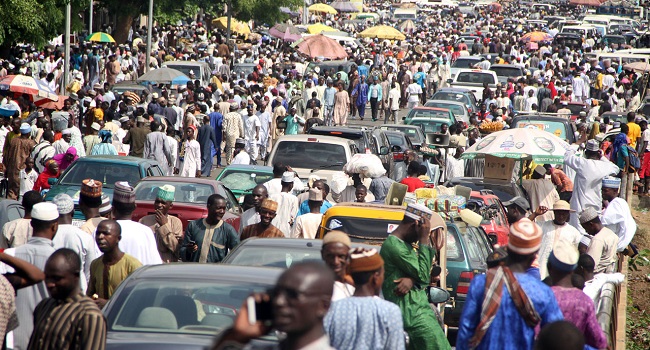News
Corruption remains a serious problem in Nigeria, SERAP survey reveals

A new public survey released today (Wednesday) by Socio-Economic Rights and Accountability Project (SERAP) shows that corruption remains a serious problem in Nigeria.
It also showed, that corruption is affecting majority of Nigerians, despite authorities’ oft-repeated commitment to address the problem.
According to the survey, “96.2% of the respondents believed corruption remains a serious problem in Nigeria today. There was no significant difference in opinion on this issue across the different geo-political zones surveyed.
However, only 5% of the respondents from the North-West viewed corruption as a problem in the Nigerian society.”
In addition to the acknowledgement that corruption is a major problem in Nigeria, the survey further established that “84.5% of Nigerians believed corruption affects them.”
The latest report by SERAP entitled Nigeria: Anti-corruption Social Norms Survey was launched today in Ikeja, Lagos State. The survey is published as part of the organisation’s implementation of the Anti-Corruption in Nigeria (ACORN) project funded with UK aid from the British people.
The survey shows that social media and the internet are the most common sources of information on corruption, according to 38% and 33% respectively, of the respondents surveyed. The survey further shows that to successfully reach majority of Nigerians and influence behavior change; these are the most dependable channels.
In contrast, only 9.8% and 1.6% mentioned religious institutions and traditional rulers respectively, as influential to influence behavior change.
Read also: Senate to probe CBN over N20tn unremitted stamp duty
According to the survey, “Traditional leaders have lost their place in guiding the society on morals and ethics. Another noteworthy observation made on the diminishing role of the traditional leaders was recorded as follows: Some of the traditional rulers are key political players. They influenced elections for politicians who in turn grant them favors. Paying traditional rulers using public money managed by politicians also dilutes their power to stand against corrupt leaders.”
The report read in part: “Almost half of the respondents (43.5%) surveyed do not believe that corruption can be successfully fought in Nigeria. The result paints a citizenry that has resigned to the high levels of corruption. This response should be juxtaposed with 96% of the respondents who viewed corruption as a major problem in Nigeria and 86% who believed it affects them.
“Notably, majority (23.8%) of the respondents’ perception is that this is a loss to the Nigerian people. However, a significant 18.8% view theft of public money as a loss to the government. This should be a cause for alarm as it would be hard to mobilize citizens against corruption until the point where Nigerians view it as an economic crime against the people.
“Of greater concern is that a combined 18% seem to tacitly approve or at least admire the acts of corruption and illicit wealth acquisition. About 12% view the loss of public money as a source of wealth while 5% would even wish to get an opportunity to perpetuate such a vice.
“The implication is that while the social norms, values and experiences point to corruption as a negative vice, the citizenry have little faith in the efforts aimed at tackling it. Further inquisition on the negative perception of anti-corruption efforts pointed to the need for a mindset change. Some of the adverse attitudes identified were influenced by perceived lack of punishment of corrupt persons.
“This further entrenches the corrupt tendencies. Additionally, poverty among citizens was seen to compromise the expected citizen pressure against corruption. Some respondents mentioned the ease with which political players bribe their way to positions and once in office perpetuate corruption. The societal values that do not find voter bribery as repugnant therefore cultivates weak and corrupt leadership.
“On the issue of personal responsibility against corruption, about 57% of the respondents believed they have a role in supporting anti-corruption efforts. It should be a matter of concern that more than 40% do not think there is anything they can do on this front.
“Majority of the respondents who did not see their role in reducing or eliminating corruption (52%), were in a sense of helplessness as they either believed there is nothing an ordinary person could do to fight corruption or had negative experiences that nothing changes even when citizens make effort.
“Perhaps the most adverse observation in this context was that 15% of the respondents believed it is the government’s role to fight corruption. This finding resonates with an almost equal proportion of the respondents who viewed the loss of large amounts of money through corruption as a loss to the government, and not the public.
“It is imperative that Nigerians acknowledge corruption as thievery of their own money to cultivate a sense of personal responsibility against the vice.”
“The Federal Government should respect the rule of law and obey all court orders to improve the integrity and independence of the judiciary.
“The Federal Government should ensure effective and full enforcement of the Freedom of Information Act to encourage citizens’ access to credible information about the frequency of corruption among public officials and in ministries, departments and agencies. This would help to gauge and change descriptive norms about corruption in Nigeria and subsequent behavior.”
Join the conversation
Support Ripples Nigeria, hold up solutions journalism
Balanced, fearless journalism driven by data comes at huge financial costs.
As a media platform, we hold leadership accountable and will not trade the right to press freedom and free speech for a piece of cake.
If you like what we do, and are ready to uphold solutions journalism, kindly donate to the Ripples Nigeria cause.
Your support would help to ensure that citizens and institutions continue to have free access to credible and reliable information for societal development.
























